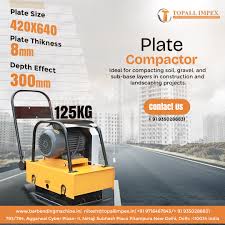business-services

August 06,2025 • 3 min read
How to Choose the Right Plate Compactor for Your Project

When it comes to soil and asphalt compaction, a Plate Compactor is an indispensable tool in any construction arsenal. Whether you’re preparing a driveway, compacting soil for a foundation, or laying down pavers, using the right type of compactor can significantly influence the quality and longevity of your project.
But with various types, sizes, and specifications available from multiple Plate Compactor Manufacturers and Suppliers, how do you choose the best one for your needs?
In this guide, we’ll walk you through everything you need to know to choose the right Plate Compactor — tailored to your project type, working conditions, and budget.
🛠️ What is a Plate Compactor?
A Plate Compactor is a type of construction equipment that uses a heavy, flat plate to create vibration and compress soil, gravel, or asphalt into a dense and stable surface. These machines are typically used in roadwork, landscaping, pipeline laying, and foundation work.
They come in different forms:
-
Forward Plate Compactors – Ideal for smaller, less demanding compaction tasks.
-
Reversible Plate Compactors – Can move forward and backward, suitable for deeper compaction.
-
Heavy-Duty or Hydraulic Plate Compactors – Used for large-scale industrial and commercial projects.
📋 Key Factors to Consider When Choosing a Plate Compactor
1. Type of Material to Be Compacted
Different surfaces require different compaction strategies:
-
Granular soils (e.g., sand, gravel): Forward plate compactors work well due to their fast, high-frequency vibrations.
-
Cohesive soils (e.g., clay, silt): Reversible or heavy-duty compactors with higher centrifugal force are better suited.
-
Asphalt: Use compactors with water tanks to prevent material from sticking to the base plate.
👉 Tip: Consult with Plate Compactor Manufacturers or Suppliers to match the compactor with your soil type.
2. Project Size and Scale
Ask yourself:
-
Is it a small residential project or a large commercial one?
-
Will you be compacting large areas or tight spaces?
-
For driveways and sidewalks, a lightweight forward plate compactor is typically sufficient.
-
For roads, foundations, and large-scale sites, a reversible or heavy-duty compactor will save time and labor.
3. Compaction Force and Frequency
Understanding the Centrifugal Force (CF) and Vibration Frequency is crucial:
-
Centrifugal Force (kN): Determines how deep the compactor can compress the surface. Higher CF is better for thicker soil layers.
-
Frequency (vpm): Higher frequency is ideal for granular soils. Lower frequencies are better for cohesive soils.
Ask Plate Compactor Suppliers to provide the machine’s force rating and match it with your application.
4. Base Plate Size and Shape
The base plate is the component in contact with the surface. Size and shape impact the maneuverability and effectiveness.
-
Narrow base plates: Ideal for trenches and tight areas.
-
Wide base plates: Best for open areas where coverage speed matters.
8. After-Sales Support and Spare Parts Availability
Opt for Plate Compactor Suppliers who provide:
-
Warranty coverage
-
Local service centers
-
Easy availability of spare parts
-
Technical support
This is especially important for long-term operations and commercial use.
🔚 Conclusion
Choosing the right Plate Compactor is more than just selecting a machine — it's about understanding your project's demands, the surface material, and the long-term goals of your construction activity.
By considering factors like material type, compaction force, frequency, and manufacturer reliability, you can make a well-informed decision that maximizes efficiency and quality.
Before you purchase, always consult with trusted Plate Compactor Manufacturers or Suppliers to get expert recommendations and ensure your investment delivers the best value.
Topallimpex Details
User Profile
- Full name
- Topallimpex
- Email address
- Barbendingmachineoffpage@outlook.com
- Join Date
- 2025-08-06
- State
- City
- Pincode
- Address
- Follow us on Facebook
- Follow us on Twitter
- Website Name
- Bio